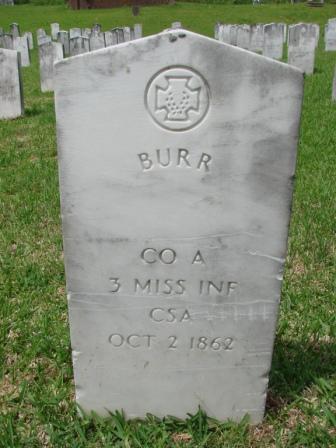|
Not Forgotten |
|
|
Home
CSA Veterans at Cedar Hill
Known CSA Soldiers at Soldiers' Rest |
|
|
For autumn/winter quarters of the 3 Miss Inf, Co. E, see
For what was going on with a member of Co. E, see Herman Fink's (Harmon Finck) service record. Pvt. Fink, musician in 3 Miss Inf, Co. E, was paroled at Vicksburg 6 Jul 1863 at Vicksburg. A remark in the comments section of his card says, "Good man." He must have broken parole. He was soon arrested and sent to Camp Morton, Indianapolis, being received there 13 Aug 1863 and in the same month enlisted with the 32 Ind Vols. Fink's name appears on an undated list of POWs captured at Vicksburg, which is noted, "These Prisoners were Paroled, went outside of the lines with their Command, Deserted and came back."
|
This man, soldier Burr, is another name mystery that must be solved. No Burr is mentioned in fold3, except as given names, and those are not in the right regiment.
Ragland's Fisher Funeral Home Records, pg. 23, has
this entry: It is "Not Stated" where Co. A was located at the time of Burr's death. As an aside, we do know that Co. E was located "Near Yazoo River" and "Near Vicksburg." The Pet Goose Marches with Band The 3 Miss Inf, Co. E, was preparing its winter quarters near Vicksburg when Pvt. Fink, a trombone player in the band, purchased a goose from a seller of fowls with the intention of fattening it up to eat. Once he learned it was 30 years old, he had a change of heart and it became a company pet. "The first time he took his trombone out for practice the boys were surprised at the action of the gander, which kept perfect time to the music, and paid strict attention to every movement of his new owner. So his wings were clipped and he was allowed the freedom of the camp. Day by day the gander became more interesting, and he was soon known to all the officers and men of Featherstone's Brigade. At general review the gander would appear at the head of the Third Mississippi's band, marching with a very soldierly air. He would swing his head from right to left as if watching the surroundings with especial care, and wag his tail to the time of the music with as much precision as an accomplished drum major would wield his baton." Veteran Tom Hall submitted this short article to the Confederate Veteran, Vol. IX (1901), pg. 228. He added that "many of the soldiers owned pets."
|
|
|
|
|
Use back button to return.
|
|
